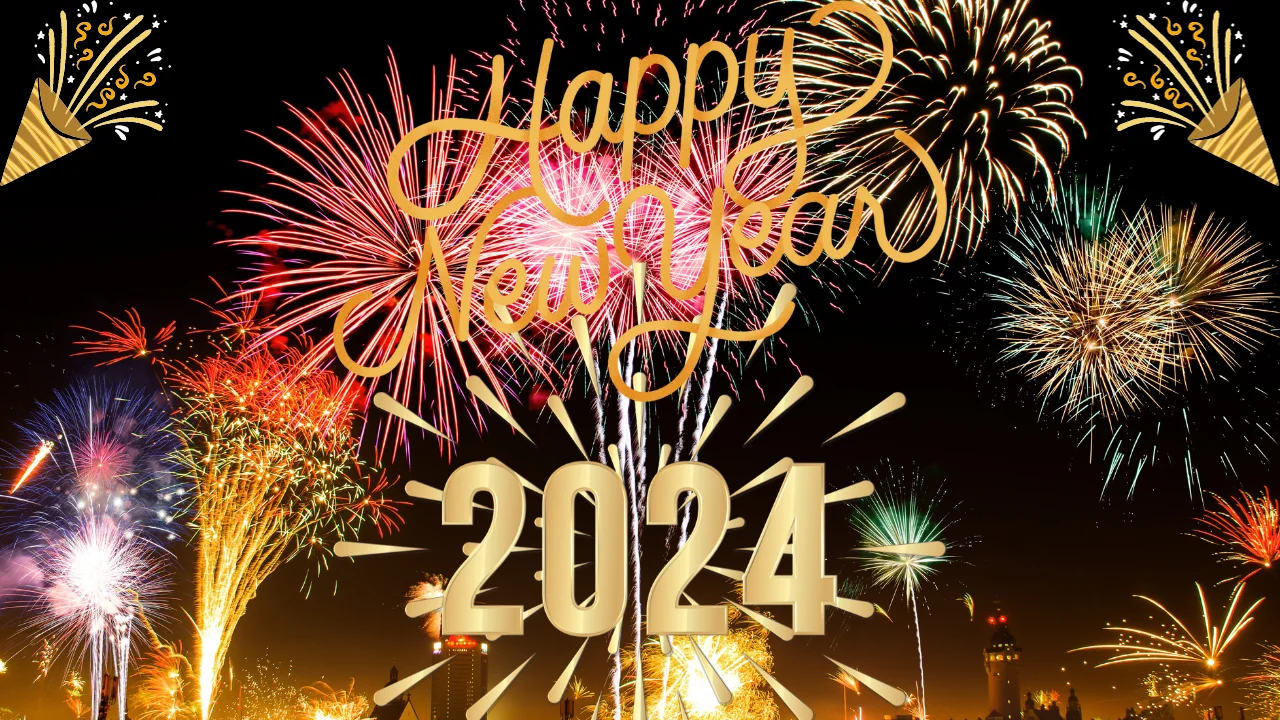Happy New Year 2024
New Year’s Day 2024 is just around the corner, and with it comes the excitement of fresh beginnings, new resolutions, and the hope for a brighter future. Here’s a glimpse into what you can expect:
New Year’s Day 2024 – When and Where?
- New Year’s Day 2024 falls on Monday, January 1st.
- Celebrations will take place across the globe, from bustling city centers to tranquil rural areas.
New Year’s Day Traditions and Customs
- Fireworks displays: The night sky will be illuminated with dazzling fireworks, symbolizing the banishing of the old year and the welcoming of the new.
- Countdown to midnight: People will gather around clocks, counting down the last seconds of the year before erupting in cheers and celebrations as the new year arrives.
- Making resolutions: Many individuals will set personal goals and aspirations for the upcoming year, aiming for self-improvement and growth.
- Sharing meals and gifts: Families and friends will come together for special meals or exchange gifts, fostering bonds and strengthening relationships.
- Parades and cultural performances: Many cities will host vibrant parades and cultural shows, showcasing diversity and celebrating the festive spirit.
Significance of New Year’s Day 2024
- New beginnings: New Year’s Day marks the end of one chapter and the start of another, offering an opportunity to reflect on the past, learn from experiences, and set intentions for the future.
- Hope and optimism: The day is filled with hope for a brighter and more fulfilling year ahead. It encourages us to embrace possibilities, believe in ourselves, and strive for our dreams.
- Gratitude: It’s a time to appreciate the blessings and good things in life, express gratitude for loved ones, and acknowledge the challenges overcome in the past year.
- Unity and togetherness: New Year’s Day brings people together, regardless of their differences, to celebrate and share joy in the spirit of community and belonging.
Planning Your New Year’s Day
Whether you prefer a quiet reflection, a wild party, or quality time with loved ones, there are countless ways to make New Year’s Day 2024 special. Consider these ideas:
- Plan a gathering with friends and family.
- Attend a local event or watch the fireworks display.
- Set meaningful resolutions and write them down.
- Reflect on the past year and express gratitude.
- Start a new tradition, like planting a time capsule or writing a letter to your future self.
- Focus on self-care and relaxation to prepare for the year ahead.
No matter how you choose to celebrate, remember that New Year’s Day is a chance to create lasting memories, embrace new possibilities, and step into the future with optimism and joy. So, let’s raise a toast to a fantastic 2024!
Gregorian Calendar
The Gregorian calendar is the internationally accepted civil calendar used in most parts of the world today. It’s a solar calendar with 12 months and a total of 365 days in a common year, with leap years adding an extra day every four years to keep it aligned with the Earth’s revolution around the sun.
History and Development
- Julian Calendar: The Gregorian calendar is an adaption of the Julian calendar, established by Julius Caesar in 46 BCE. However, the Julian calendar’s year was slightly longer than the actual solar year, leading to a gradual drift over time.
- Papal Bull: In 1582, Pope Gregory XIII introduced the Gregorian calendar to address the drift. He adjusted the calendar by removing 10 days from October, bringing it back into alignment with the equinoxes.
- Gradual Adoption: The Gregorian calendar wasn’t immediately adopted by all countries. Catholic countries were quicker to adopt it, while Protestant and Orthodox countries took longer. It wasn’t until the 20th century that it became the dominant global calendar.
Key Features
- Solar Calendar: Based on the Earth’s revolution around the sun, ensuring seasons and months stay consistent.
- 12 Months: January to December, with varying lengths from 28 to 31 days.
- Leap Years: Every four years (except for century years divisible by 400), adding an extra day to February to account for the slight difference in the solar year.
- Weeks: Seven days in a week, with no connection to the lunar cycle.
Impact and Significance
- Standardized Timekeeping: The Gregorian calendar provides a unified system for global communication, trade, and travel, facilitating coordination and reducing confusion.
- Religious Observances: Many religious holidays are based on the calendar, ensuring consistency for celebrations like Easter and Christmas.
- Cultural Significance: Months, weeks, and dates have become ingrained in our language, customs, and traditions.
Criticisms and Challenges
- Complexity: Leap-year rules can be confusing and challenging for some to understand.
- Religious Bias: The calendar’s adoption by the Pope has raised concerns about its religious origins and potential bias.
- Proposed Reforms: There have been discussions about calendar reforms to address minor discrepancies and improve accuracy, but none have gained widespread acceptance.
Despite its imperfections, the Gregorian calendar remains the dominant global calendar, providing a standardized and relatively accurate framework for timekeeping and human activities. Its impact on our lives and understanding of time is undeniable. It will likely remain the world’s standard for the foreseeable future.
1st January 2024 Special Day
As the distinct date of January 1st, 2024 approaches, people around the world excitedly anticipate New Year’s Day and the chance for a renewed beginning it brings. The symbolic timing of the January 1st calendar date presents the perfect opportunity to set aspirational goals for growth, recalibrate priorities, and manifest optimism. The early arrival of 2024’s special New Year’s Day rekindles hope for a promising year ahead and a future brimming with potential.
- RRB ALP Vs RRB JE, Which is Better Job?
- Central Bank of India Apprentice Exam Date 2025 Out
- SSC CHSL English Syllabus 2025, Check Detailed Syllabus
- SSC GD Constable Exam News & Next Notification Update
- SBI PO Handwritten Declaration 2025, Format, Image Size
- Biology MCQs for SSC CGL, Get Solved Questions with Answers

Hello, I’m Aditi, the creative mind behind the words at Oliveboard. As a content writer specializing in state-level exams, my mission is to unravel the complexities of exam information, ensuring aspiring candidates find clarity and confidence. Having walked the path of an aspirant myself, I bring a unique perspective to my work, crafting accessible content on Exam Notifications, Admit Cards, and Results.
At Oliveboard, I play a crucial role in empowering candidates throughout their exam journey. My dedication lies in making the seemingly daunting process not only understandable but also rewarding. Join me as I break down barriers in exam preparation, providing timely insights and valuable resources. Let’s navigate the path to success together, one well-informed step at a time.






